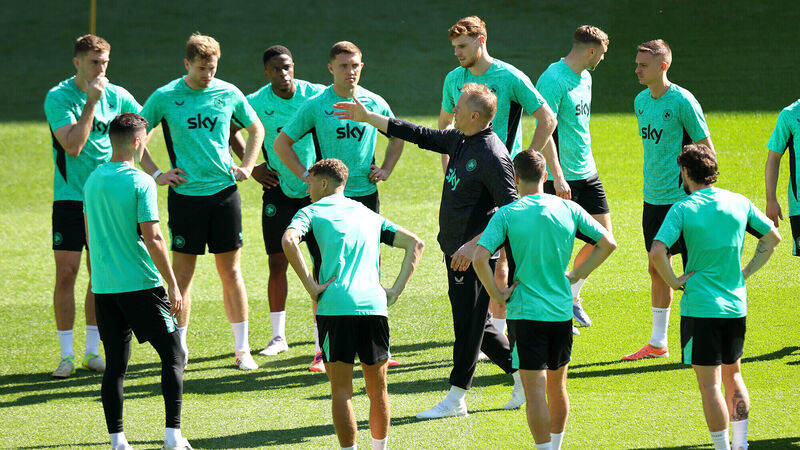Dion Fanning: Hallgrimsson might be in his final days as Ireland manager, but is there a world where this doesn’t matter?

CIRCLE OF TRUST: Ireland head coach Heimir Hallgrimsson during a training session at Estadio Jose Alvalade in Lisbon ahead of tonight’s World Cup qualifier with Portugal. Picture: Ryan Byrne/Inpho
When Sepp Blatter revealed that the FAI had asked to be ‘Team 33’ at the 2010 World Cup, it seemed to be a reflection of the desperation of Irish football.
There was a sense of injustice, of course, because Ireland had been denied by the Henry handball, but there was also a need for the financial injection a World Cup would bring.
By that stage, the dream that the FAI’s share of the Aviva Stadium would fund Irish football had been irretrievably damaged.
The Vantage Club had been launched the year before with John Delaney looking at Ireland in boom as the solution to all our problems. That solution included selling some 10-year tickets for €32,000.
“We have 33,000 millionaires in this country and there is a database of 88,000 people we are chasing,” Delaney declared. “We only need 3,000 sales because, on average, our research says that each buyer will purchase three to four seats. We’ll do it, we’ll be fine. It makes us easily afford our capital commitment to the project. Our aspiration is to sell out and I think we will have most sold before we open the new stadium.”
The launch took place three days after the collapse of Lehman Brothers and shortly before Ireland announced the bank guarantee. Irish football was positioning itself in the middle of a world which was about to disappear.
The millionaires were a dwindling breed in the years that followed and if there were football people among them, they saw no need for 10-year tickets when games were never sold out.
A few years later, I talked to one person involved in ticket sales and he told me that often he would have promising conversations with potential customers who would then cheerily ask, “And this includes tickets to rugby internationals doesn’t it?” When they were told no, the trail would go cold. Paying tens of thousands to watch Ireland play Norway, Wales, North Macedonia, and Armenia was a tough sell.
So a place at the World Cup in 2010 offered a bandage on the wound, if not a cure, for Ireland’s problems. ‘Team 33’ was a hope driven as much by that need as any footballing desire.
Blatter would not provide that but Fifa did subsequently grant the FAI a €5m loan which led to more problems for Delaney five years later.
This was how Irish football felt doomed to operate: Qualification was as much about the financial impact as what it would say about Irish football. The last few years have been so bleak that even that element of wishful thinking has disappeared.
Irish football has been in many surreal spots over the years but it is unusual for a big match build-up to begin with the budget.
But it may be that the €3m funding for Irish academies secured by the FAI in the budget this week creates a different model for Irish football. It will not help Ireland in Portugal tonight but after the Armenia game last month, it is hard to know what will.
This funding was due to extensive work by Will Clarke, the FAI’s League of Ireland academy director, who has made a persuasive and compelling case for what this money can do.
What links it to many of the despairing moments in Irish football is that Will Clarke does not see this government funding as a handout but as seed capital in creating an industry. This is where people like Clarke offer hope for a different future.
If Irish football get their academy structure right, then there can be real change in the game which can create an industry.
If players of the standard of Mason Melia and Victor Ozhianvuna are developed in Irish academies then the clubs will have more funding and Irish football will have more success.
This is something that Clarke has pointed out that can’t be done simply by hoping Ireland qualify for major tournaments, even if that hope is often extinguished quickly.
After the defeat to Armenia, Clarke tweeted that “The harsh reality is that our #LOIAcademy system currently ranks between 92-96 in the top 100 ranked countries in the world and the impact of Brexit has yet to reach the MNT yet.”
In other words, if you think this is bad, pull up a seat. These players went through the UK academy system but the next generation won’t and they will be struggling in an Irish academy system that is in desperate need of money.
By that stage Ireland may have fallen even more behind the countries they hope to compete with.
At the moment, even with that dubious benefit of UK academy involvement, Ireland can wonder about the players available to Heimir Hallgrimsson.
At the end of what could be a long night in Lisbon, Ireland might be wondering again about the talent or the lack of it. “We don’t have different kinds of midfielders,” Hallgrimsson said this week. “I said from the beginning that there wasn’t much difference between the midfielders we had.”
There was a time when these were the evenings when Ireland would produce an unexpectedly powerful performance. Does this team have that within them? If they do, they are keeping the signs of it a closely guarded secret.
Hallgrimsson said Ireland will need to be “almost perfect” to avoid losing in Portugal while acknowledging that Yerevan was on the players’ minds.
He has reached that point most Ireland managers do where he is wondering if there is anything or anyone else available.
He reflected last week on youth development in general, not just in Ireland. “Who is the potential leader? Are we looking at that? Is that one just too noisy and we put him away and pick this one, because he can juggle the ball more? I think that is part of the problem in how we select youth teams. I am answering something I shouldn’t be answering, but that is how I feel.”
He may look at his squad and wonder where that defiance is coming from. Ireland’s greatest hope might be that they have nothing to lose. After the first 45 minutes against Hungary, Ireland’s ability to play when there is any expectation must be questioned. Only in the second half, with all expectation gone, was there any fight and that was aided by a Hungarian red card.
It has been said that a sports psychologist would help with these moments, but Ireland might need more than that.
It may be a reflection of where Irish football is that the debates that once revolved around exiled players like Liam Brady, Andy Reid, or Wes Hoolahan now focus on a sports psychologist. There is no player out there who is believed to be a saviour so what can we draw from those who are there?
It would be a lot of pressure to put on a player or a manager, let alone a psychologist.
But Ireland right now are desperate again. Hallgrimsson may not last much longer if the next two games go as badly as many fear. There is nothing to suggest things will get better anytime soon. Irish football has always existed in the short term and right now the senior team can look no further than Tuesday night.
Irish football’s moods have been dictated by the boom and bust of the national team, although there has not been much boom. It may be that, with this budget announcement, something more sustainable than boom and bust emerges.
CONNECT WITH US TODAY
Be the first to know the latest news and updates





